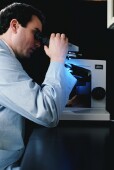- Are You Making This Expensive Thermostat Error This Winter?
- Recognizing the Signs of Hypothyroidism
- 10 Strategies to Overcome Insomnia
- Could Artificial Sweeteners Be Aging the Brain Faster?
- Techniques for Soothing Your Nervous System
- Does the Water in Your House Smell Funny? Here’s Why
- Can a Daily Dose of Apple Cider Vinegar Actually Aid Weight Loss?
- 6 Health Beverages That Can Actually Spike Your Blood Sugar
- Treatment Options for Social Anxiety Disorder
- Understanding the Connection Between Anxiety and Depression
New Stool Test Shows Promise as Colon Cancer Screen


A new at-home stool test screens for colorectal cancer with more than 90 percent accuracy, researchers report.
“That kind of result is really unprecedented for a noninvasive stool-based screening,” said study co-author Dr. Steven Itzkowitz, director of the gastroenterology fellowship program at the Icahn School of Medicine at Mount Sinai in New York City.
Though not yet approved for use by the U.S. Food and Drug Administration, the Cologuard test features a DNA analysis not included in other fecal exams.
“By increasing the pick-up rate in this way,” said Itzkowitz, “we found that the new test had a 92 percent sensitivity for detection of colorectal cancer.”
Last year, nearly 143,000 new cases of colorectal cancer were diagnosed in the United States and almost 50,000 Americans died of the disease, according to the U.S. National Cancer Institute. Yet, one-third of Americans fail to heed public health recommendations to undergo more invasive colonoscopy screenings every 10 years starting at age 50, Itzkowitz noted.
Commonly used stool tests such as FIT (fecal immunochemical testing) rely on detecting blood in the stool. This new multi-target test checks for blood as well as abnormal DNA coming from the tumor, “with the advantage that some lesions, even cancers, don’t bleed very much,” Itzkowitz explained.
The research, published in the March 19 issue of the New England Journal of Medicine, was funded by Exact Sciences Corp., the Wisconsin.-based maker of Cologuard.
To assess the potential of the DNA method, nearly 10,000 men and women aged 50 and older were screened for colon cancer and precancerous polyps at one of 90 sites across the United States and Canada. All were considered at average risk for colon cancer.
Each patient was screened three ways: by means of a standard colonoscopy; a commercially available fecal test (FIT); and the new DNA test, which requires patients to collect their own stool sample at home and mail it in for laboratory analysis.
In the end, colonoscopy screenings — considered the gold standard of colon cancer screening — unearthed colon cancer in 65 participants, while another 757 were found to have advanced precancerous lesions.
The new test accurately detected 60 of those 65 cancers. The FIT test spotted only 48 cancers, with an accuracy rate of 74 percent compared to 92 percent for the new test.
The DNA test was less accurate with respect to precancerous lesions, spotting about 42 percent of cases. Yet that still topped FIT, which detected roughly 24 percent of precancerous lesions. Cologuard’s sensitivity was 69 percent for precancerous polyps most likely to progress to cancer versus 46 percent for the FIT test.
However, the DNA test was more likely to falsely suggest the presence of cancer than either a colonoscopy or FIT testing.
“It’s not a perfect test,” Itzkowitz acknowledged. “But neither is a colonoscopy. Also, I don’t think we’re saying that this test should be done as a replacement for a colonoscopy, but rather as an adjunct. Certainly if a person who does this test comes out with a positive reading then they will need to do a colonoscopy afterwards to confirm it.”
Dr. Frank Sinicrope, a professor of medicine and oncology at the Mayo Clinic in Rochester, Minn., said “these data demonstrate the superiority of stool DNA testing compared to FIT for colorectal cancer screening.”
Sinicrope, who was not part of the study team, also suggested that the Cologuard method might offer some advantages over standard colonoscopies.
In particular, he pointed to the DNA test’s success in identifying certain advanced-stage polyps, noting such precancerous growths are typically flat and “located in the right side of the colon and are difficult to detect at colonoscopy.”
Nevertheless, Sinicrope said there are still “important issues that await further research.” Those would include determining how best to deal with false positive results and establishing how often patients should take the DNA test to maximize its screening potential.
More information
For more information on colorectal cancer visit the U.S. National Cancer Institute.
Source: HealthDay
Copyright © 2026 HealthDay. All rights reserved.










